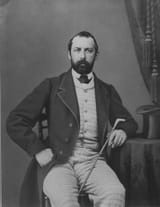The third king of the House of Bernadotte and the first to be raised a Lutheran from childhood, Charles XV succeeded his father Oscar as Swedish king in 1859 at the age of 33. Married nine years earlier to Louise of the Netherlands, the marriage, as with most royal unions, was one of political convenience; Louise was a well-read and sophisticated but physically homely woman with poor social skills and the Crown Prince found comfort in a number of mistresses instead. Because Charles was known to have a haughty, authoritarian personality, many Swedes were unnerved about the prospect of him becoming king but ultimately he was a successful, competent, and popular ruler who adhered to the legal limits placed on the Swedish monarchy since 1848. Charles embarked on a large scale reform of the country's legal system and penal codes. In a nod to women's rights, Charles allowed unmarried women to be recognized as proper Swedish citizens which had not been the case before; only married women had the full rights and privileges of citizenship.
Charles advocated close political and cultural ties between the Scandinavian states and offered military assistance to Denmark when war with Prussia threatened in 1864. But in the end, the king, realizing Sweden's poor state of military preparenedess, backed out on the offer. In 1868 Sweden established diplomatic and trade contacts with Japan.
